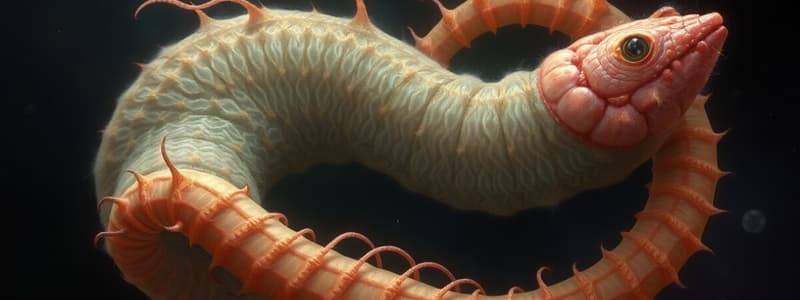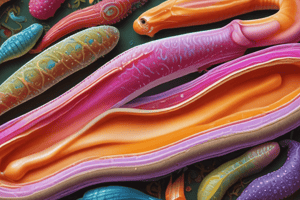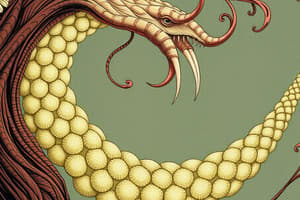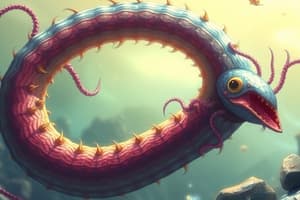Podcast
Questions and Answers
What is the structure called that includes the segments of a tapeworm?
What is the structure called that includes the segments of a tapeworm?
- Proglottids
- Strobila (correct)
- Scolex
- Rostellum
In the life cycle of Taenia solium, which of the following is the most likely mode of transmission that leads to cysticercosis?
In the life cycle of Taenia solium, which of the following is the most likely mode of transmission that leads to cysticercosis?
- Consumption of water contaminated with proglottids
- Ingestion of undercooked beef containing cysticerci
- Direct penetration of the skin by larvae
- Autoinfection through ingestion of eggs (correct)
Why are eggs not typically found in human stool samples when diagnosing Echinococcus granulosus infections?
Why are eggs not typically found in human stool samples when diagnosing Echinococcus granulosus infections?
- The eggs are only produced in the intermediate host.
- Eggs are rapidly degraded in the intestinal environment.
- The adult worms reside outside the intestinal tract.
- The infection is caused by the larval stage forming hydatid cysts within tissues. (correct)
Which of the following statements accurately distinguishes between Taenia saginata and Taenia solium?
Which of the following statements accurately distinguishes between Taenia saginata and Taenia solium?
What feature is characteristic of helminths in the class Cestoda?
What feature is characteristic of helminths in the class Cestoda?
What makes Hymenolepis nana unique compared to other cestodes?
What makes Hymenolepis nana unique compared to other cestodes?
Which of the following terms describes the primary mechanism by which tapeworms attach to the intestinal wall of their host?
Which of the following terms describes the primary mechanism by which tapeworms attach to the intestinal wall of their host?
How is infection with Echinococcus granulosus most commonly transmitted to humans?
How is infection with Echinococcus granulosus most commonly transmitted to humans?
Which of the following best describes the function of the 'neck' region in cestodes?
Which of the following best describes the function of the 'neck' region in cestodes?
In a patient diagnosed with cysticercosis, which diagnostic method would be most effective in visualizing the larval cysts in the brain?
In a patient diagnosed with cysticercosis, which diagnostic method would be most effective in visualizing the larval cysts in the brain?
What is the function of proglottids in cestodes?
What is the function of proglottids in cestodes?
Which of the following is the primary mode of transmission for Hymenolepis nana?
Which of the following is the primary mode of transmission for Hymenolepis nana?
What is the implication of hermaphroditism in cestodes?
What is the implication of hermaphroditism in cestodes?
Which of the following statements accurately describes the geographical distribution of Taenia saginata and Taenia solium?
Which of the following statements accurately describes the geographical distribution of Taenia saginata and Taenia solium?
Which medication is typically the first choice for treating a Taeniasis infection?
Which medication is typically the first choice for treating a Taeniasis infection?
What feature is particularly important when differentiating between tapeworm eggs?
What feature is particularly important when differentiating between tapeworm eggs?
Which human activity contributes most significantly to the transmission of Taenia solium?
Which human activity contributes most significantly to the transmission of Taenia solium?
What histological characteristic is used in diagnosing cysticercosis?
What histological characteristic is used in diagnosing cysticercosis?
What is the role of rodents in the life cycle of hymenolepis nana?
What is the role of rodents in the life cycle of hymenolepis nana?
What is the most common sign of cysticercosis?
What is the most common sign of cysticercosis?
Which is a known cause of Taeniasis?
Which is a known cause of Taeniasis?
What tissue does the Hydatid cysts attack most often?
What tissue does the Hydatid cysts attack most often?
What is a good method to determine if there are calcified cysts?
What is a good method to determine if there are calcified cysts?
What type of test is administered to those who suspect a hydatid cyst?
What type of test is administered to those who suspect a hydatid cyst?
How is Hymenolepiasis transmitted to others?
How is Hymenolepiasis transmitted to others?
What is the main treatment of Hymenolepis nana?
What is the main treatment of Hymenolepis nana?
What anatomical part of the tapeworm is used for attachment?
What anatomical part of the tapeworm is used for attachment?
Where does the adult tapeworm mature in humans?
Where does the adult tapeworm mature in humans?
What are the two types of medically important Cestodes?
What are the two types of medically important Cestodes?
Which animal is the definitive host for Echinococcus granulosus?
Which animal is the definitive host for Echinococcus granulosus?
Which of the following is a feature of tapeworms?
Which of the following is a feature of tapeworms?
What is the primary means of preventing Taenia saginata infections?
What is the primary means of preventing Taenia saginata infections?
Larval stage of cestodes are known to live in what type of tissues?
Larval stage of cestodes are known to live in what type of tissues?
What symptoms are likely to be experienced with Neurocysticercosis?
What symptoms are likely to be experienced with Neurocysticercosis?
Cestodes are mainly what type of helminths?
Cestodes are mainly what type of helminths?
What is the infective stage in humans of Echinococcus granulosus?
What is the infective stage in humans of Echinococcus granulosus?
What is the infective stage in humans of cysticercus cellulosae?
What is the infective stage in humans of cysticercus cellulosae?
Flashcards
What are Helminths?
What are Helminths?
Helminths are parasitic worms.
What are Platyhelminthes?
What are Platyhelminthes?
Platyhelminthes, also known as flatworms, belong to the phylum Platyhelminthes.
What are Nemathelminthes?
What are Nemathelminthes?
Nemathelminthes, also known as roundworms, possess a cylindrical shape.
What are Trematoda?
What are Trematoda?
Signup and view all the flashcards
What are Cestoda?
What are Cestoda?
Signup and view all the flashcards
What are Nematoda?
What are Nematoda?
Signup and view all the flashcards
What are Cestodes?
What are Cestodes?
Signup and view all the flashcards
What is a Scolex?
What is a Scolex?
Signup and view all the flashcards
What are Proglottids?
What are Proglottids?
Signup and view all the flashcards
What are Gravid proglottids?
What are Gravid proglottids?
Signup and view all the flashcards
What are the 3 sections of cestodes?
What are the 3 sections of cestodes?
Signup and view all the flashcards
What is Taenia saginata?
What is Taenia saginata?
Signup and view all the flashcards
What is Taenia solium?
What is Taenia solium?
Signup and view all the flashcards
What is Taeniasis?
What is Taeniasis?
Signup and view all the flashcards
What is Cysticercosis?
What is Cysticercosis?
Signup and view all the flashcards
How is Taenia saginata transmitted?
How is Taenia saginata transmitted?
Signup and view all the flashcards
How is Taenia solium transmitted?
How is Taenia solium transmitted?
Signup and view all the flashcards
What are the symptoms of Taeniasis?
What are the symptoms of Taeniasis?
Signup and view all the flashcards
What is the treatment for Taeniasis?
What is the treatment for Taeniasis?
Signup and view all the flashcards
What are the symptoms of Cysticercosis?
What are the symptoms of Cysticercosis?
Signup and view all the flashcards
How is Cysticercosis diagnosed?
How is Cysticercosis diagnosed?
Signup and view all the flashcards
What is Hymenolepis nana?
What is Hymenolepis nana?
Signup and view all the flashcards
What is Hymenolepiasis?
What is Hymenolepiasis?
Signup and view all the flashcards
How is Hymenolepis nana transmitted?
How is Hymenolepis nana transmitted?
Signup and view all the flashcards
What are the symptoms of Hymenolepis nana infection?
What are the symptoms of Hymenolepis nana infection?
Signup and view all the flashcards
How is Hymenolepis nana infection treated?
How is Hymenolepis nana infection treated?
Signup and view all the flashcards
What are Tissue Cestodes?
What are Tissue Cestodes?
Signup and view all the flashcards
What is Cysticercus cellulosae?
What is Cysticercus cellulosae?
Signup and view all the flashcards
What is a Hydatid cyst?
What is a Hydatid cyst?
Signup and view all the flashcards
What is Echinococcus granulosus?
What is Echinococcus granulosus?
Signup and view all the flashcards
What does infection by Echinococcus granulosus cause?
What does infection by Echinococcus granulosus cause?
Signup and view all the flashcards
How is Echinococcus granulosus transmitted?
How is Echinococcus granulosus transmitted?
Signup and view all the flashcards
Where are Hydatid cysts found?
Where are Hydatid cysts found?
Signup and view all the flashcards
What do hydatid cysts cause?
What do hydatid cysts cause?
Signup and view all the flashcards
How are hydatid cysts diagnosed?
How are hydatid cysts diagnosed?
Signup and view all the flashcards
How are hydatid cysts treated?
How are hydatid cysts treated?
Signup and view all the flashcards
Study Notes
General Information
- Lecture 4 covers Cestodes (tapeworms) for the Spring 2025 PM603 Parasitology and Virology course.
- Helminths (worms) are classified into Platyhelminthes (flatworms) and Nemathelminthes (cylindrical worms). Platyhelminthes include Trematoda (flukes) and Cestoda (tapeworms).
Characteristics of Cestodes
- Tapeworms are Platyhelminthes, known for their flattened, ribbon-like, segmented bodies and hermaphroditic nature.
- The body of a tapeworm consists of a rounded head called Scolex, and a flat body consisting of segments called proglottids.
- Segments (proglottids) are added below the scolex as the worm grows
- No alimentary canal is present.
- The oldest proglottids produce eggs and are found at the distal ends of the worm.
- Cattle, pigs and fish can become hosts after eggs are excreted into faeces and transmitted.
Morphology of Cestodes
- Scolex (head): Equipped with muscular suckers and a crown of hooks (rostellum) for fixation.
- Neck region: Serves as the generative part.
- Strobila (body): Consists of segments (proglottids) that are immature, mature, or gravid.
- Eggs are non-operculated and contain a six-hooked (hexacanth) embryo or onchosphere, however eggs are not found in E. granulosus.
General Life Cycle
- Adult worms mature in the human intestine and eggs are shed via faeces into the environment.
- Grazing animals ingest the eggs, and larval forms encyst in their tissues.
- Humans get infected when they eat the meat of infected animals with encysted larvae.
Classification of Medically Important Cestodes
- Intestinal Cestodes: Taenia spp. (T. saginata, T. solium) and Hymenolepis spp. (H. nana).
- Tissue Cestodes: Echinococcus granulosus.
Main Intestinal Cestodes
- Taenia saginata: Beef tapeworm, measures 4-12m.
- Taenia solium: Pork tapeworm, measures 2-7m.
Life Cycle of Taenia saginata and Taenia solium
- Taenia spp' life cycles involves oncospheres hatching, penetrating the intestinal wall, and circulating to musculature, where they develop into cysticerci.
- Humans get the parasite from raw or undercooked infected meat.
- Taenia saginata is transmitted by swallowing Cysticercus bovis larvae in beef, which causes Taeniasis.
- Taenia solium transmission occurs by the swallowing of Cysticercus cellulosae larvae in pork which causes Taeniasis.
- T. solium can also be transmitted via auto infection which causes Cysticercosis.
- Diagnostic stage includes eggs of T. solium in faeces or when swallowed by men.
- The adult lives solely in the small intestine of humans.
- Taenia saginata is cosmopolitan in areas where cattle are consumed, while Taenia solium is cosmopolitan in areas where pigs are consumed.
Taeniasis pathogenesis and clinical features
- Most infections are asymptomatic, intestinal disturbances, obstruction, loss of weight, and appendicitis may occur.
- T. solium scolex may cause severe intestinal disturbance, but symptoms are usually mild.
Diagnosis and Treatment of Taeniasis
- Clinical picture, presence of eggs in faeces, and gravid proglottids in faeces are all indicative of infection
- Praziquantel is used for treatment, Niclosamide and Albendazole also used.
Pathogenesis & Clinical Picture of Cysticercosis
- Neurocysticercosis, eye inflammation, bulging eye are symptoms that depend of the organ affected due to ingesting the eggs of T. solium
- It can trigger seizures, headaches, stiff neck, nausea, and vomiting.
- Larval stages of the Cysticercus cellulosae develop in extra intestinal tissue.
- Adult-onset seizures are triggered by Cysticercosis.
Diagnosis and Treatment of Cysticercosis
- Biopsy, X-rays, CT scans, and serological methods are used for diagnosis.
- Anthelminthic therapy, anticonvulsants, corticosteroids, and surgical removal are used in treatment.
Hymenolepis nana (Dwarf Tapeworm)
- The adult worm is the smallest tapeworm in humans (15-40mm) and causes Hymenolepiasis.
- Infections are common in children in areas of poor sanitation and is cosmopolitan.
- It lives in the small intestine of rodents, rats and mice.
Transmission of Hymenolepis nana
- Via the ingestion of eggs by a 2-host cycle, with rodents as definitive hosts and grain beetles, fleas, or other insects as intermediate hosts.
- Via the human-to-human oral-anal cycle, as well as internal autoinfection.
Clinical Features and Pathogenicity of Hymenolepis nana
- GIT upset, weight loss, dizziness, and convulsion are symptoms and manifestations.
- Diagnosis is through the presence of eggs in faeces.
- Niclosamide and Praziquantel are used for treatment.
Tissue Cestodes
- Cestodes are typically Intestinal helminthes, however its larvae can exist in tissues of men
- Cysticercus cellulosae (larvae of Taenia solium) and Hydatid cysts (larvae of Echinococcus granulosus)
Echinococcus granulosus
- Adult worms are 2-7mm long, and have a scolex with a rostellum, and three attached segments (immature, mature & gravid).
- This causes Hydatid disease and is transmitted through ingestion of eggs in food or by hands which were contaminated by feces of dogs.
- Cysts are known to be found primarily in the liver, followed by the lungs and spleen.
Clinical Features and Pathogenicity of Echinococcus granulosus
- Composed of a sac full of protoscolices in hydatid fluid is called hydatid sand
- Slow growth of hydatid cysts can cause death, obstructions or pressure on organs.
- Cysts may cause anaphylactic shock, pulmonary symptoms like sputum containing blood and cyst fluid if ruptured and is used to destroy bones
Diagnosis and Treatment for Echinococcus granulosus
- CT and ultrasound scanning, X-rays, and the Intradermal casoni test may be helpful.
- For treatment, surgical removal of Hydatid cysts is used.
Studying That Suits You
Use AI to generate personalized quizzes and flashcards to suit your learning preferences.



